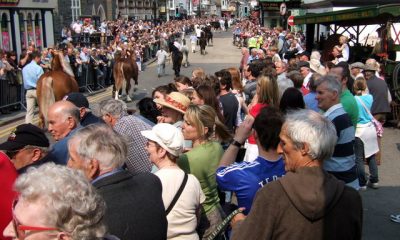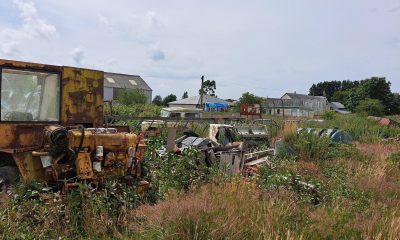Farming
Wales’ new Chief Veterinary Officer starts in the role

TODAY (Mar 13), Dr Richard Irvine begins his new role as Wales’ Chief Veterinary Officer.
Dr Irvine joins the Welsh Government having been UK Deputy Chief Veterinary Officer and policy Deputy Director for Global Animal Health in the UK Government.
A highly experienced veterinarian, Richard has been working in the profession for more than 25 years and brings with him a wealth of knowledge and expertise, with a background in animal health and welfare, trade policy, as well as science and state veterinary medicine.
Richard has previously spent time in a clinical mixed veterinary practice in South Wales.
He has also held different roles leading animal health surveillance and science programmes at the Animal and Plant Health Agency.
Dr Irvine said: “Farmers and veterinarians throughout Wales do a fantastic job and I’m looking forward to meeting and supporting them as Wales’ Chief Veterinary Officer.
“We are all committed to protecting the health and welfare of animals and by working together we can meet the challenges we face and accomplish our collective goals.
“Much has been achieved in Wales and my work, alongside the team in Welsh Government, is to build on that.
“I’m looking forward to getting to work and making a real difference here in Wales.”
Rural Affairs Minister Lesley Griffiths said: “I’m very pleased to welcome Richard as our new Chief Veterinary Officer.
“Richard’s leadership and expertise will be crucial in delivering our ambitious Animal Health and Welfare goals and Programme for Government commitments.
“His knowledge and experience will be a great asset and I look forward to working with him.”
Farming
E-Tickets now on sale for Pembrokeshire County Show 2024

E-TICKETS are now on sale for this summer’s Pembrokeshire County Show, the largest county agricultural show in Wales. Preparations are coming together well for what is set to be a fantastic two days of livestock, competitions, attractions and much more.
General entry tickets for the show, taking place on Wednesday and Thursday, 14 & 15 August, are now available at an ‘early birds’ rate online from the website. Ticket prices have had to increase slightly to cover costs but still remain below 2019 charges. The early bird rate for Adults is £15, children £8 (5-16 years), Carers as well as children four years and under are free. Please visit: www.pembsshow.org to purchase your e-tickets.
Adam Thorne, President of Pembrokeshire Agricultural Society said, “At the event in August visitors will be able to tickle their tastebuds in the Castell Howell Food Hall, marvel at the livestock classes, enjoy watching the dog agility, be wowed by the showjumping, explore the horticulture, arts and crafts entries.
Shop ‘til they drop in the Country Market area, which will showcase over 40 quality local and award winning product and craft stalls and much more.”
Pembrokeshire Agricultural Society Membership packages are also available and these include admission to the Show and the Members’ Area. Purchasing membership of the society will support its aim to promote, advance and improve agriculture, horticulture and rural crafts and skills by the improvement of livestock and the demonstration and showing of livestock, machinery, crafts, products, methods and processes connected with agriculture and agricultural education in particular by the holding of an annual show. Full details are available on the website: Become A Member | Pembrokeshire County Show | Pembs Agricultural Society (pembsshow.org)
Putting together this event is hard work and requires an enormous effort by the staff, volunteers and trustees of Pembrokeshire Agricultural Society. The Society is indebted to so many for their commitment and support in helping host the event.
A special mention must go to the county show sponsors. Pembrokeshire Agricultural Society is proud to have many local, regular, sponsors who make the event possible.
Sponsorship Director, Richard Cole, said, “Sponsorship and Pembrokeshire County Show have been a successful combination for the last 45 years. Sponsors have enjoyed promoting their businesses through the varied mediums of banners, announcements, show rings, buildings, equine and livestock classes and championships over the years. It isn’t too late. If you’d like to discuss becoming a corporate sponsor please complete the form on our website: www.pembsshow.org.”
Farming
Pembrokeshire Agricultural Society in search for county’s top progressive farmers

IF you farm in Pembrokeshire and can demonstrate your farm’s use of the latest technological methods to promote progressive, sustainable agriculture then the Pembrokeshire Agricultural Society encourage you to enter the prestigious Baron de Rutzen Award.
Adam Thorne, Pembrokeshire County Show President, said, “We are looking for local Pembrokeshire farmers, under the age of 45, who can demonstrate their farm’s use of the latest technological methods to promote progressive, sustainable agriculture. They also need to show consideration for the environment and habitat sensitivity on their farm as well as present an aesthetically pleasing example of farming in the county. The competition welcomes all livestock and arable sectors to take part.”
Last year’s winners of the Award were Mark and Caroline Davies of Little Newcastle, Haverfordwest. They milk 230 pedigree Holsteins through a fully automated system. They rear their own replacements and also have a small beef enterprise. The farm is all grassland and they follow a strict reseeding and liming policy to optimise the yield from their multi-cut silage system. The couple place significant emphasis on animal health, husbandry and breeding to maximise the efficiency of their system.
Baron John Fredrick De Rutzen was President of Pembrokeshire Agricultural Society in 1936 and the Baron de Rutzen Trophy was produced in his memory. The third Baron served in the Welsh Guards and tragically died, aged 36, in 1944.
This year’s entrants must be fully practising farmers within the county of Pembrokeshire and were under the age of 45 years on 1 January 2024. Entries can either be by nomination or direct application online on the Pembrokeshire Agricultural Society website. Click here to apply: Baron de Rutzen Award | Pembrokeshire County Show | Pembs Agricultural Society (pembsshow.org)
The closing date for nominations and applications is at noon on Wednesday, 29 May 2024.
Farming
Pembrokeshire Agricultural Society elect new president

ARABLE and beef farmer, Adam Thorne, has been unanimously elected to become the new President of Pembrokeshire Agricultural Society for the year ahead. Adam is the third generation of his family to hold the position.
During the Annual General Meeting of Pembrokeshire Agricultural Society, held last week on the Pembrokeshire Showground, Mr Tim John and his wife Margaret John were also voted in as Presidents elect.
Adam Thorne has had a long association with Pembrokeshire Agricultural Society. After visiting the show as a toddler, then helping show the family’s pedigree Herefords, his uncle got him into helping him with stewarding in his early teens. From there he progressed to being a Steward with his own section, Commercial Cattle, and then also the Butcher’s Lambs section.
From stewarding, Adam became involved with committee work, starting as an Executive and then on to the former Finance and General Purposes Committee. He has been Chairman of the Estates Committee for 12 years and is now a Board member and a Trustee.
Adam said, “I am proud of my long association with Pembrokeshire Agricultural Society. I am the third generation to now be President, following my late grandfather, Walter Thorne, my father, Robert Thorne and more recently my uncle, George Thorne. I am looking forward to my year in the prestigious position.”
Away from his work with the society, Adam runs the family’s arable and beef farm in Robeston West, Milford Haven. He has been heavily involved with Tiers Cross YFC from an early age, having been Club Secretary twice and Chairman. He has also sat on Pembrokeshire County YFC Committees and the Wales YFC Rural Affairs Committee.
The 2024 Pembrokeshire Agricultural Society officeholders, announced at the AGM, include Miss Ffion Edwards who was awarded the role of Ambassador at last year’s show. Ffion, a nurse from Maenclochog, has enjoyed many years of attending the county show and believes that there are so many good elements to it. Ffion has been a member of Llysyfran YFC for 15 years and enjoys every aspect of young farmers – trying new experiences, competing and travelling to name a few. Mrs Nicola Owen was also elected as the Honorary Treasurer.
Brian Jones, the outgoing Pembrokeshire Agricultural Society President, took the opportunity to thank everyone who had helped and supported him throughout his presidency. During his year as President, Brian and his wife Helen, raised a tremendous amount of money for various charities including the Pembrokeshire Agricultural Society, RABI, Tir Dewi and the DPJ Foundation. Brian also gave his assurances that Castell Howell will continue to sponsor the Food Hall for future years.
Pembrokeshire County Show, the largest county agricultural show in Wales, will be held over two days again this summer on 14 and 15 August. Everyone is invited to attend the celebration of rural life in the county.
Pictured (left to right): Ffion Edwards the Ambassador for 2024; Adam Thorne, President; Margaret and Tim John, the Presidents Elect.
-

 News4 days ago
News4 days agoPolice and air ambulances at ‘serious incident’ at West Wales school
-

 Business1 day ago
Business1 day agoLargest Welsh port appoints communications and marketing director
-

 Crime3 days ago
Crime3 days agoPembrokeshire pensioner accused of 17 sexual offences against children
-

 Crime3 days ago
Crime3 days agoAll three school stabbing victims discharged from hospital, police confirm
-

 Community5 days ago
Community5 days agoCounty Hall to offer space for community banking
-

 Crime6 days ago
Crime6 days agoBrian Davis: Wanted on suspicion of commercial burglary
-

 Education7 days ago
Education7 days agoTarget of 1m Welsh speakers by 2050 is “almost impossible”
-

 Sport5 days ago
Sport5 days agoSwifts eyes on double.


























